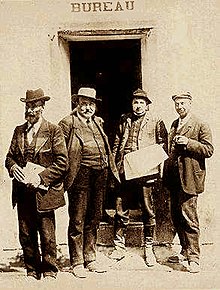Marcelin Albert
"[5] In 1902, 1903 and 1905 Albert travelled around the villages of region talking to small groups of vinegrowers and workers and trying, without much success, to convince them to set aside their differences and form committees to demand help from the government.
[6] Albert avoided politics, but spoke out for the rights of honourable, hard-working people who had been exploited by defrauders, merchants and the government.
It read, "The undersigned have decided to pursue their just claims to the end, to go on strike against the tax, to demand the resignation of all the elected bodies and commit all the communes of the south and Algeria to follow their example with shouts of 'Long live natural wine!
[10] On 18 February 1907 Albert sent a telegram to Prime Minister Georges Clemenceau in which he spelled out the suffering in the Midi due to the slump.
The Committee was composed of President Marcelin Albert, Vice-President Édouard Bourges and Secretaries Cathala, Richard and Bernard.
[12] The parliamentary committee to review the situation arrived in Narbonne on 11 March and received a delegation led by Albert.
[11] After their testimony the winegrowers' committee made a tour of the city, for the first time singing La Vigneronne, which from that day became the anthem of the revolt of the paupers.
He refused to engage in the debate on the divergent interests of the workers and the owners, did not question the presence of royalists who openly wanted to claim the movement, and did not appreciate that on the pretext that the Occitan language is the mother tongue of the Midi wine growers, the regionalists want to make the fight into a separatist movement.
[14] Jean Jaurès spoke and then Albert launched an ultimatum to the government asking it to raise the price of wine.
Ernest Ferroul set this ultimatum to expire on 10 June and advocated a tax strike if the government had not acted by then.
Marcelin Albert delivered such a speech that the journalist for Le Figaro wrote, "It was mad, sublime, terrifying".
[14] On 19 June Ernest Ferroul was arrested at dawn at his home in Narbonne by troops of the 139th Infantry Regiment and imprisoned in Montpellier.
[21] He wrote of Albert, He seemed to soar, this Don Quixote in a Cronstadt Cap, with his black beard and gaunt face; he seemed to encircle all the earth in a large embrace, all the plains and all the garrigues in one protective gesture.
And the windmills of our mundane and mechanized age are equally formidable phantoms as those against which railed the knight of the sorrowful countenance.


